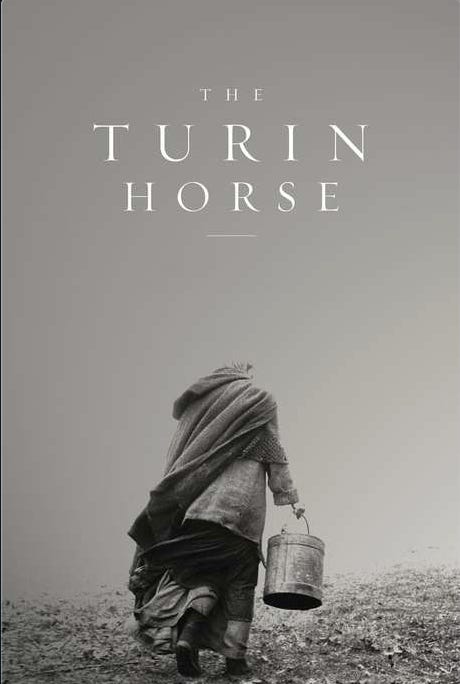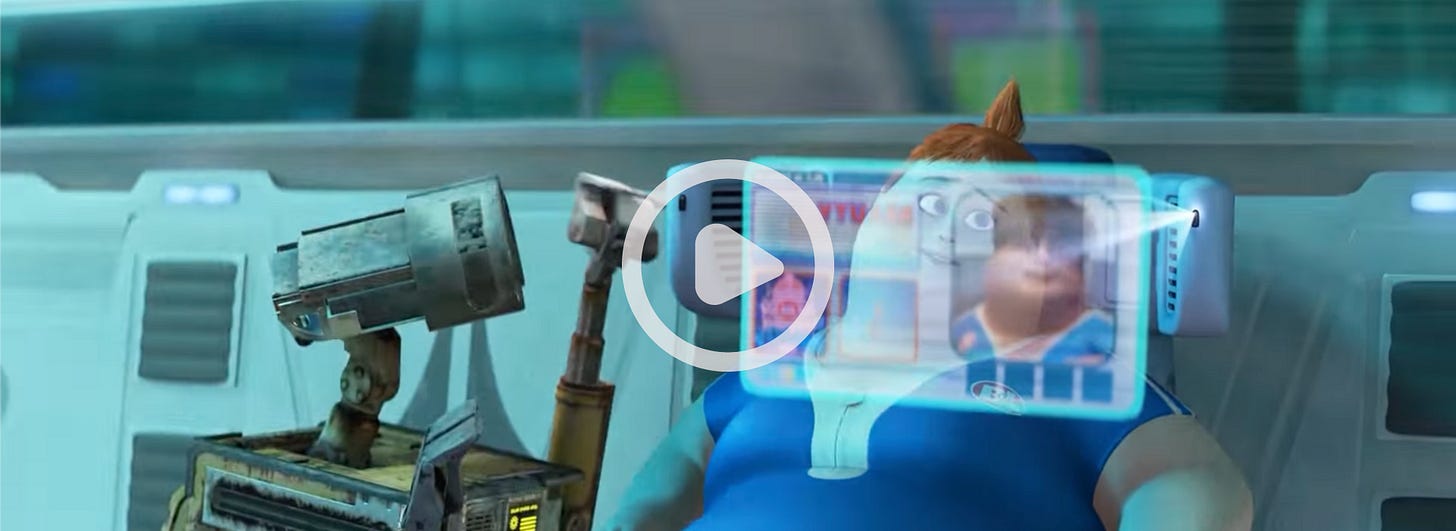Knowing What You Like, And Why It Matters
So much of entertainment is algorithm'd for us. Do you know your taste?
This post is a proposal of the present and future, and how you can navigate it. We’re in, I would say, the beginning of the end of algorithm’d entertainment.
The tech companies would, like WAll-E, like to funnel us into clearly defined, limited buckets of inexpensively-produced (at least on the human capital side, and certainly on the art side with both style and substance regardless of the actual cost) “content.” It’s not art to them. It’s just a product to be sold. And because it’s not seen as art or part of a human culture and healthy, diverse society, it is only to be packaged for those buckets.
They want to do it for the algorithm which can utilize AI and funnel us into these buckets — herding us, so to speak, down specific, pre-designated corridors that fit in the Wall Street gamble of predictability (if there is such a thing).
After doing this for a while, they hope to train us to go down these specific corridors without thought. Connected. Told where to go. Told what is good. Told what we need or don’t need. As they wrap around and control all the main distribution points, along with the production and main sources of capital, even theaters, it’s no wonder that we start to see homogenous and limited entertainment offerings. Today the cool color is red, they say. Tomorrow, it’s blue. Will we follow?
Can they predict?
It’s been the holy grail for decades to try and predict what audiences will like. Use AI, they say, and the prediction is possible. Of course, as long as the specific corridors are defined, with no other exits, then the AI can probably be more predictable, for a little while.
Six months ago, CBNC’s interviews of top media companies thought they had an answer, and you’d think that they would have access to all the top-notch data. But here we are, four months after the writer and actor strikes started, and very few of them predicted anything near where we are now. Case and point.
Film and television’s (not the algorithm’d “content”) success has always depended on several things, not just data. Certainly, being able to see what audiences respond to and being aware of general interests and trends has long been a staple in future and present success analysis, but what is always elusive is human behavior and future events.
It’s maybe not so elusive if you’re intuiting beyond the data, as a human, but that isn’t usually what these big companies do. Intuiting is also not a science, faaaarrrr from it. But it is tapping into an energy, a conglomerate of thought, paired with your own thoughts and feelings. Packaged into something unique, cared for, and given generously. There will be an audience for it. But, back to my thesis point.
We are in a point in time in which it is the beginning of the end of data-driven companies trying to take over human behavior and trying to co-opt future events. Yet, largely because of what the companies have done to the U.S. writers and actors in Summer 2023 with the U.S. strikes, humans across the planet are becoming more aware of the companies’ intent to put us in bubbles and control the input and output. It’s not like having us all buy only 5 types of toothbrushes — that might actually be useful. Instead, this is about them capitalistically trying to take away our individual identities, culture, taste, human expression, and our very existence in both the creation and experience of art. All in the name of greed and money.
Why your taste matters
Before I continue with how to combat this greed and this diminishing of entertainment options because of the algorithms, let’s talk about taste. Because taste is, in large part, the solution to better days.
Do you know your four favorite films and why? Ava DuVernay does —
She originally mentions “Claudine” (romantic comedy) due to the beautiful love story and the joy the characters find amid their challenges. But DuVernay recently changed her favorite on Letterboxd to “Nothing But a Man” (romantic drama) with themes of 1960s racism and dealing with oppression. One cannot help but think how both of these films influenced her work on “Queen Sugar.”
West Side Story, says DuVernay, is a film she saw on television when she was nine years old. She says she has never forgotten it and deeply affected her. Later, she recalls it as an example of how art can be used as a vehicle for activism.
While in the clip above she doesn’t go into why she likes “The Turin Horse,” on Twitter a few years back she stated “I’m a Béla Tarr fan. Started craving ‘Turin Horse’ a couple of weeks ago. I watched through and enjoyed. And have since come to just ‘having it on’ at various times over the last few weeks. I find it comforting. Like we’re all in the house together. Wild.” Auteur Director Béla Tarr is known for creating “social cinema” (art impact, displaying social problems) with an aim to tell stories about everyday people utilizing cinema vérité. Most of DuVernay’s films are social cinema.
Her final favorite is Martin Lawrence’s “Black Knight” which she says is a family favorite at Christmastime, a guilty pleasure. “It’s ridiculous. It’s hilarious. It is a family picture for me,” DuVernay says.
What I love about these current picks, is that you can see how not only have they influenced her filmmaking, but also that she’s not afraid to list a film that’s just for her. No doubt, she has many more favorites that are not confined to just four for Letterboxd. However, none of them are because of an algorithm. Each has a personal taste, a personal reason.
What are your favorite films and why?
I took this challenge. And I’m still figuring it out, so don’t hold me to them in case I decide to swap out (so hard to pick!). Currently they are:
Granted, the first two are popcorn fare, but “E.T.” was incredibly emotional for me in spite of it being an alien movie; it was full of heart and began my love of all Spielberg storytelling, influencing my writing and imagination to this day. “Close Encounters of the Third Kind” has similar threads to E.T., however it was a more grown-up version with complex relationships and a grounding in sci-fi realism.
“The Birds” is a terrific example of suspense. Its camera angles, its thriller aspects, its elevated drama into genre, speckled with horror — definitely before its time. There are bird scenes that go really far without VFX. Hitchcock takes it to the edge with the attacks, the watchful eye. And, of course, I like the female lead.
“Only Lovers Left Alive” is my left field choice. I deeply appreciate the character work, the condensed locations with the production design, the acting, and the costumes. It also has a female lead. Jim Jarmusch is a fierce supporter of independent cinema, which additionally resonates with me. Yet, this film in particular blends both the indie and the commercial.
If I were to go through film festival and Oscars lists, over the years, I’d find dozens more that I could comment on. But these are just a few.
Why your taste matters
Some might say that it’s not worth one’s time to come down to four films that they love, and why. Some might say that it certainly doesn’t matter if they are not in the arts, television and film. There are a multitude of reasons why, perhaps, it’s not worth your time to take up this challenge. But I’ll tell you why you should.
It doesn’t matter if you work in television or are a filmmaker, taste is a reflection of not only what you like to watch but also part of your personal journey to figure out what matters to you — overall, with your life.
Art is not meant to be enjoyed in a vacuum.
There’s a fourth act in a film, for example, that happens after you see a film: it’s when you talk to someone about what you saw. It’s the meaning that you bring to the art, how it affects you, the experience you had, how you are changed (even slightly) from watching it. The same can be true for any type of art — if it has a theme, is moving (emotionally) in any way, makes you think or feel, takes you to another “place,” or opens your mind to other possibilities, then you are changed.
As you figure out what moves you, what you enjoy, seek it out. Support it. Let the creators know it matters to you and why, so that they can be buoyed up to create more.
We need diversity of taste to create vibrant art. Artists watch and listen to other artists. It creates innovation. Support what you like, your taste, and this supports the health of the entire art system across the planet — which equals a healthy society. Art is culture. Art is activism. Art is mental health. Your taste matters.
The end of algorithm’d entertainment
As I proposed at the top of this post, the end of algorithm’d entertainment is just beginning. We’re tired of DC and Marvel. We want new things. We’re starting to recognize the difference between “content” and art. And we’re noticing when media companies aren’t supportive of art and the creators.
This awareness is going to drive change and change behaviors. The best talent will go where they can reflect their taste, their stories, be compensated, and support cinema and art access.
The more we nurture our individual tastes, the more the industry will have to shift to more diverse offerings. If the U.S. government can break apart the media conglomerates, this will also make the entertainment industry not only more sustainable but also more receptive to various tastes. Diversity will once again come to cinema. And independent companies and filmmakers can reign again, to all our benefit.
Unhook yourselves. Take a little time to figure out what resonates with you. Spend time there.
UPDATE 9/25/23: Martin Scorsese says basically the same thing in regards to comic-book films taking over cinema and “training” us to only like that and nothing else.
“The danger there is what it’s doing to our culture,” he said. “Because there are going to be generations now that think movies are only those — that’s what movies are.”








